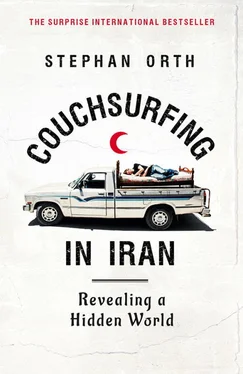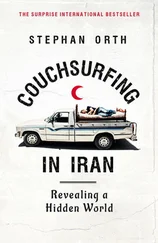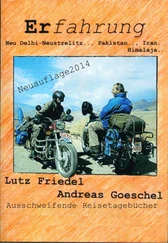“It’s like Saudi Arabia, isn’t it? Don’t even think about looking any women in the eyes,” says a travel journalist.
“Are you going to grow a beard? Bring me back a carpet,” says a girlfriend.
“Are you crazy? I just don’t understand what you want there,” says a colleague from Iran.
Four weeks previously. As soon as the wheels of the TK898 flight from Istanbul touch the runway, a different time scale applies. The Iranian calendar—plus 2.5 hours, minus 621 years. Welcome to Imam Khomeini International Airport: it is 7 Farvardin 1393; Happy Nowruz ; Happy New Year. A rotund man sitting in 14B tips the last drops of his Efes beer down his throat. The teenaged girl in 17F pulls on socks to cover her ankles. Black, blond, brown, red, gray, dyed, styled, groomed, ruffled, short, and long hair all disappear under black, brown, and red scarves. You can tell the foreigners from the Iranians by the way that the unaccustomed piece of cloth slips to the neck on opening the overhead compartments and has to be readjusted. Respected Ladies: Observe the Islamic dress code is written on a poster at the terminal—without “please” or “thank you.”
Above an illuminated ad for Sony cell phones at the baggage carousel, I am greeted by the first posters of the two bearded ones, ten times larger than life. Ayatollah Ruhollah Khomeini looks wily and somber; even in the photo his eyes seem to penetrate everything. With heightened intellect and infinite frostiness, the leader of the revolution looks down on the world. By contrast, the incumbent Supreme Leader Khamenei, with his large glasses and expressionless eyes, seems almost gawky and harmless, which is remarkable as Ayatollah Khamenei is one of the most powerful and brutal state leaders of recent times.
But then again, maybe this impression is just a question of degree: measured against the gray eminence Ayatollah Khomeini, even Saddam Hussein and Muammar Gaddafi look like nervous Quran students revising for exams. The eyes of both ayatollahs seem to say: “From now on we are watching you—wherever you go.” The portraits hang in every shop and every restaurant, in residential and government buildings, in mosques, hotels, and bus terminals. In Iran, to avoid the pictures of Ayatollah Khomeini and Ayatollah Khamenei, you have to be in your own apartment or blind.
7 Farvardin 1393. As far as the legal situation is concerned, I also have to rethink by a couple hundred years. In Iran sharia prevails. In Iran, women, in legal terms, are worth half as much as men and can be stoned to death for adultery. In Iran, I’m a criminal because I have more than three pounds of Lübeck marzipan (containing a tiny amount of alcohol) and a couple pork cabanossi sausages in my backpack. All that’s missing are a couple copies of Playboy and I could win a cup with the inscription: Tehran’s Dumbest Entry Attempt. However, without a few violations of the law, what I plan to do would be impossible. So why not start as I mean to continue? The sooner I get used to my new role as crook, swindler, and actor, the better.
7 Farvardin 1393. My cell phone refuses to configure years before 1971 (why 1971?). As punishment for disobeying orders, I insert an Iranian SIM card into the rebellious device. To purchase it I had to sign three forms printed in Persian. I ask the assistant what they contain; he doesn’t speak English well.
“No problem!” he replies, and on registering my quizzical look, he repeats, “No pro blem!” but this time in a gentler, almost friendly, tone.
I desperately need a local SIM card, so I sign. Maybe I have just consented to allow the secret service to monitor all my conversations and text messages, but I couldn’t care less. They do it anyway. It even says so in the security information of the State Department.
I have more luck exchanging money. An employee at the cash desk of the Melli Bank tells me that he can give me 35,000 rial per euro, but that one floor higher I will receive 40,000 at the currency exchange there. Eventually, I get 41,500—not a bad rate at all. That’s a first for me: I had to travel all the way to Iran to be given sound advice by a banker.
I will have plenty of contact with money changers, as the local ATMS don’t accept European bank cards. That is pretty impractical for long-term travelers; I am traveling for two months with 2,000 euros and US$1,000 in small denominations strategically concealed in various inaccessible areas of my luggage. Hopefully, I will remember where they are all hidden when I need money.
The airport with six carousels is smaller than you would expect from a city of 10 million like Tehran. Towering columns, plenty of glass, plenty of concrete. No Starbucks, no McDonald’s, no Louis Vuitton, just local fast-food joints, banks, and souvenir shops. A massive poster depicting a goldfish in a bowl—the symbol of life—wishes everyone a Happy New Year. There is probably no other country in the world in which a fish in a bowl symbolizes life.
Whole extended families with bunches of flowers wait for the new arrivals. They got up in the middle of the night to be here on time. It’s just after 4 AM. Looking at them I feel very blond and relatively tall. Put it this way: the chances of someone asking me for directions are practically zero.
“Welcome to Iran,” say two young women wearing chadors. Chador means “tent” in Persian, which says all you need to know about the nature and femininity of this garment. “Where are you from?” they want to know. “Are you married or single?” Giggling, they then drift away in their ghostly black tents.
Their outfit is not particularly representative at the airport. Most women wear simple headscarves. The younger the person, the more fashionable the color. And the more extended the back of the head seems to be because updos are totally hip. With the scarf covering, it almost looks as though many young Iranian girls have skulls like H.R. Giger’s aliens. In comparison, most of the men don’t wear any form of head covering. The combination of turban and beard being far less common than Iranian clichés would have us believe. I only see two in the whole terminal.
When, after encounters with a benevolent banker and flirtatious chador girls, a cab driver now refrains from cheating me, I have to readjust my prejudice compass after just one hour in Iran.
There is only one route from the international airport into the city. To the left of the highway 200,000 victims of the Iran-Iraq War are buried in the country’s largest cemetery. And opposite, to the right of the highway, rests Ayatollah Khomeini himself, the man who sent so many of them to their deaths. Each of the four towers bordering his grand mausoleum is ninety-one meters (three hundred feet) high, one meter for each year he lived. A huge golden cupola reflects the nighttime spotlight. The first magnificent religious building that tourists set their eyes on is the shrine of the ayatollah. The signal that every guest receives is: “This is my country, my rules apply here”—even twenty-five years after his death.
The cab stops, and the driver doesn’t want any money. The trip is for free for a friend like me. I firmly refuse to accept, as required by Iran’s complicated rules of courtesy, and he says, “Seventy thousand.”
“Rial or toman?” I inquire. There are two currency denominations in Iran, with a zero being the difference, which doesn’t make things easier for tourists.
“Toman, of course.” Okay, everything times ten.
I give him two 100,000 bills and a 500,000 bill. That’s three dollars more than the recommended price to pay that is displayed on a board at the airport. Charming character, but of course he’ll try to cheat you. At least you can rely on the cab drivers.
Читать дальше



![Stephan Orth - Behind Putin's Curtain - Friendships and Misadventures Inside Russia [aka Couchsurfing in Russia]](/books/415210/stephan-orth-behind-putin-s-curtain-friendships-a-thumb.webp)








